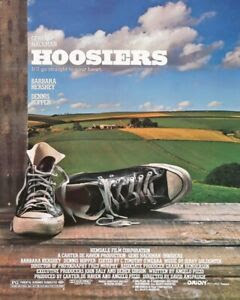Fiona Quinn's Blog
October 22, 2025
The Real World and Other Nonsense
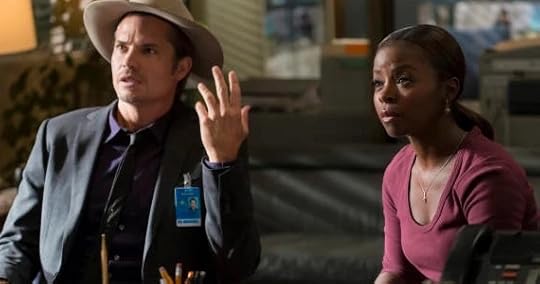 When you see the script was written by the JV squad...
When you see the script was written by the JV squad...After a questionable shooting, Federal Marshal Raylan Givens, (Timothy Olyphant) is reassigned from Miami to his childhood home of Harlan County, Kentucky. Further questionable shootings—and some first-rate writing—ensue.
The Missus and I came late to the FX series, Justified. Based on Elmore Leonard’s neo-western/ crime fiction. As with the late-great author’s other work, Justified also addresses socio-economics, race, gender, and even generational poverty. The man made hard subjects easy to read. Sharp dialogue and wry humor helps the harder stuff along.
And, mostly, the television series followed the model…for a while.
The early seasons benefited from proximity to the source material and from the maestro’s consultation. Unfortunately, the easy-reading stories and whip-crack smart dialogue in the early seasons are built on Leonard’s 50-plus-years of writing excellence. All of the above is gone by season four. Obviously, the television series writers found that it’s not as easy as it looks.
By season four, (premiered the year of Elmore Leonard’s death) the wear is showing. By season five, it was as if the show was written by poor relations.
Season five, episode two, opens with Raylan, and fellow U.S. Marshal Rachel Brooks, (Erica Tazel) arresting a neo-confederate cretin who persists in making racist comments. The cretin refers to a black man as a “boy,”—in front of two black women—before perpetuating a food stereotype to demean his housekeeper. Oh, the cretin also implies that the black women, (the one who isn’t a U.S. Marshal) is there for a transactional relationship.
“Once you’ve shown that the character carries a stick, you don’t have to beat the reader over the head with it.” -Eric Miles Williamson, author and educator
So what's wrong with depicting a bad guy as a racist? It makes them especially bad, right? Sure, to a point. Then it's simply repleting hurtful crap and exploiting it for cheap writing.
It’s no secret that Kentucky is full of neo-confederates, (the state declared neutral during the actual conflict).
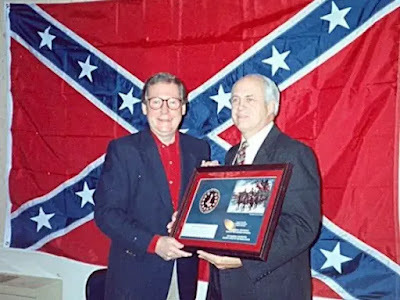 I know, I know, McConnell was too old to serve then, too.
I know, I know, McConnell was too old to serve then, too.Nor is it a secret that some men (white, mostly) will reduce relationships (typically with non-white partners) to quid-pro-quo transactions in compensation for…petty issues.
Food culture as racial epithets are the least clever of all insults—not character accents, just backward, inbred, and outdated.
Worse, when a black woman—perhaps the most maligned, denigrated demographic on earth—is relegated to a racist/misogynistic stereotype, it neither advances the story nor distinguishes the characters. It just hurts black women.
In the example cited from Justified S5 E2, Rachel, (also a black woman) does little more than shrug at the other woman’s mercenary apathy.
No one expects (or wants) an ABC After School Special monologue. But tacit approval is still approval and it reeks of someone churning out a story, fast and thoughtless.
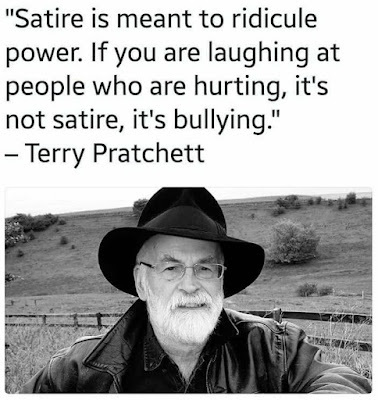 Cruelty is not what Terry trained us for.
Cruelty is not what Terry trained us for.If not clear by this point, it’s not the writers’ job to hurt people who are already hurting. Fiction has a divine purpose. Well, several divine purposes.
Purists argue that the primary purpose of fiction is to entertain. Others argue fiction is the ultimate way to tell a dangerous or at least unpalatable truth. Still others propose that thoughtful, well-written fiction can elevate the reader above their experiences and circumstances.
As a life-long reader (repeatedly elevated) with an innate love of superheroes and knights, rocketeers and badmen, I have seen all the purposes fiction serves. Mostly, I believe that our stories, our words, serve the purpose that the reader needs most.
And fiction works best when rooted in the reality that we all spring from. That shared, bitter root (hungry, lonely, scared, etc) builds the human connection between writer and reader. However, fiction cannot EVER become a slave to reality. Or propped up on reality like a crutch.
When I read my work for the first time to a crit group, I had high hopes. In a lean, ten-page chapter, I took my protagonist-thief from the end of a brutal slog, through a car theft, to a dangerous fence, (buys/sells stolen goods) and then, cash in hand, to food and shelter—all while still struggling with the effects of a horrific beating. I concluded and the group sat in silence, clearly not familiar with crime stories from that side of the game.
Finally, the group-leader, a respected writer and writing coach spoke, “Once he’s safe and secure in the bed, he should take it out and play with it.”
It was my turn for stunned silence. I mean, obvs, the crit-dude had never been on the receiving end of physical abuse. Nor had he suffered the elements for more than the distance from the store to the car. The last thing you’re thinking about when you still feel the lost fight—three days later—is sex, of any variety.
My face must’ve told the story, because the crit-group-coach guy said, “People masturbate in real life.”
Uh, yeah...
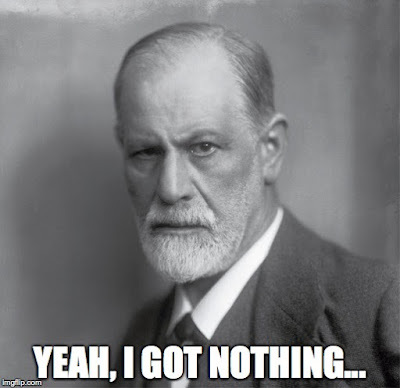
People also pick their nose, evacuate their bowels, and scratch their nethers. One would hope not all at the same time but I digress. The thing is, if none of those actions advance the story or elevate the characters.
Most importantly, if those actions aren’t a central focus of the story, (I don’t judge) none of those actions belong in the story.
Pretty much like the perpetuation of racist/misogynist stereotypes. Elmore Leonard’s work deserves better. More importantly, the view deserves better.
I own none of the photos above. All are used for educational/illustrational purposes as covered by the Fair Use Doctrine.
September 24, 2025
That's How it Ends? Subverting Expectations the Right Way
 Monk's book is a hoot, by the way
Monk's book is a hoot, by the wayI’ve written previously about marketing and writers who engage in bait-and-switch tactics. More commonly referred to (by writers) as subverting expectations, (marketers just call it “marketing”) the term means to lead an audience to expect/anticipate one outcome for a story only to end it in a different fashion.
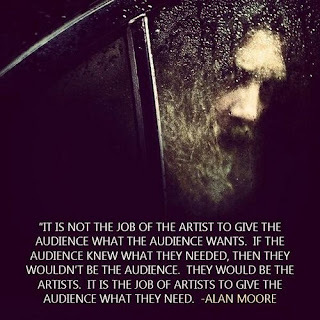 A "hoot" at parties, I'm sure.
A "hoot" at parties, I'm sure.Mostly, I”m apposed to paying for a steak and getting a PB&J, or sitting down to a movie about boxing for it to turn into a movie about assisted suicide, but I digress. There is a time when a well-executed subversion of expectations can elevate a story from entertainment to sublime delight. We’ll look at the good, the ~meh~, and the ugly.
Here’s a classic literary example
The three bears catch Goldilocks after she busted into their home, ate their food, and then crashed in their beds, possibly wrecking one. The expectation is for them to call the Po-Po, have Goldy face a judge for B&E, and make restitution. At least.
Instead, she wakes up, jumps out a window, and “flees home, never to return.” I just hope Goldy’s people got some help for her.
Clearly, this is NOT the ending that the story sets us up for. The subverted expectation works because it is written for children who don’t need to know about police action, the judicial process, or the tragedy of certain chemical behaviors. It also works because, jokes aside, Goldy intended no malice.
A tale of two happy endings
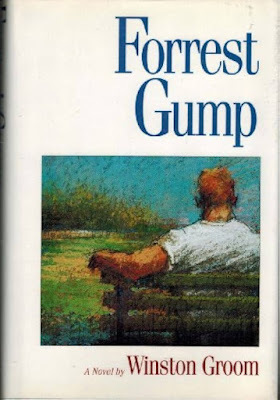 Not the one with Tom Hanks
Not the one with Tom HanksWinston Groom wrote Forrest Gump as a big fat mash note to Eisenhower Republicans after seeing stories of intellectually deficient people who achieve great things—based on positivity and ‘cause, gosh-darnit, America is just that kind of place. And so, after a 200-ish-page odyssey, (if Odyssius took the express bus home) Forrest retires to New Orleans after a failed senate bid.
It’s fine. It works. All the pieces are there.
Except…
A WHITE, millionaire-football-hero-war-veteran does not fail at a senate bid in the south and most certainly NOT in 1980's Georgia. Gump’s logical conclusion is entering the senate on a neo-con slate of candidates. From there, he wages a “common sense” war on the social safety net. But is ultimately played for a stooge by party leadership who then sacrifices him at an Iran-Contra style altar. After 18mos in club-fed, Gump then “retires” to talk radio.
Please note: subverting doesn’t mean “sad ending”
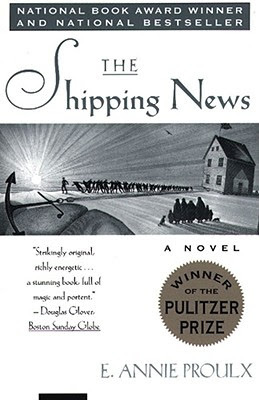 "Pulitzer" pretty-much says it all
"Pulitzer" pretty-much says it allLike Forrest Gump, death hounds Quoyle’s heels, in Annie Proulx’ The Shipping News. In the first pages, Quoyle ex-wife (who he still pines for) dies in a car crash and his ailing parents commit suicide. At the parents’ funeral, Quoyle’s distant aunt (like, “never met before” distant) convinces him to relocate his family to their ancestral home of New Foundland.
With few prospects beyond annual layoffs at the independent newspaper he works for, Quoyle takes Aunt Agnis’ advice and the family schleps off for NF. However, what he finds is not the new start he hoped for.
The family house is dead and foreboding. The family land, Quoyle’s Point, is desolate, depressing, and probably dangerous. If that weren’t bad enough, he soon finds that “Quoyle,” (the family name) is a name of deadly repute.
But amid the death around him—Quoyle nearly drowns, his boss does—Quoyle finds the voice that eluded him for years. He begins to speak up for himself. With a mentor in the local newspaper owner, Quoyle blooms as a writer. Likewise, he grows as a father and builds a loving, nurturing relationship with a woman whose life is just as hardscrubbed as his own.
Unlike Gump, Quoyle ends up neither rich nor famous. This isn't the story of pius Job or a fable of American exceptionalism, Quoyle is a man unsure of his purpose or future but committed to doing what he thinks is right. His happy ending—a place in a community that becomes home to him—is hard-earned, honest, and entirely fitting of the hard journey Quoyle took to get there.
The boy doesn’t always get the girl; a tale of two rogues…
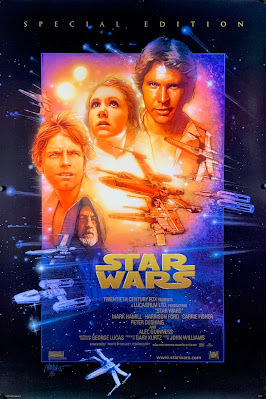 Wasn't on the original poster for a reason
Wasn't on the original poster for a reasonAcross five movies, Han Solo, (Harrison Ford in four) lies, blunders, and blasts his way out of (and into) scrape after scrape. In the original New Hope, he is the FUN—unpredictable, and perfect sorta hero—life of the party. In The Empire Strikes Back, the party’s over, you want to go to bed, and you really wish the guy would leave already. By Return of the Jedi, you realize you only ever invite the guy because he’s got a cool dog.
“He’s got no Momma, he’s got no Pappa, he’s got no past so he has no future,” Harrison Ford on his rationale to kill off Han in Jedi.
Worse, from a writer’s perspective, Han has no growth. He’s the same shallow, self-serving nerf herder in Jedi that he was in New Hope. He is immature, treats his friends like crap, and leads with his ego. Great pilot, iffy-friend, disastrous boyfriend.
The best possible outcome for this character is a valiant, (if entirely avoidable) death redeeming his less-than endearing qualities.
Sadly, the worst possible outcome is the sour marriage hinted at in The Force Awakens. So, no. This guy does not get the girl. The girl is afflicted with him, like a life-long foot fungus. He makes his wife miserable and completely abdicates his responsibilities as a father.
Knows his lane...
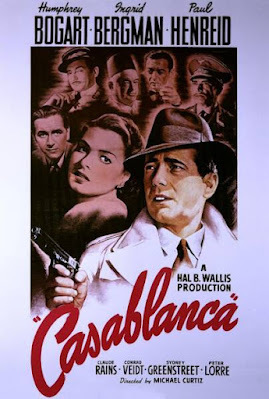 ...always shoots first
...always shoots firstLike Han Solo, Rick Blaine, (Humphery Bogart) is a soldier of fortune. Rick is just better at it. His hinted past is that of a gangster who hit his big score and then fled his country of origin.
We meet Rick at his club, Cafe Americain, in Casablanca. With the money he’s made on his booze and gambling, Rick is comfortable and well-connected, with friends—Vichy French and resistance, refugees and mobsters—in all corners. He’s also aloof, self-serving, and unconcerned with the increasing desperation of a city in full siege mentality.
Then Ilsa (Ingrid Bergman) walks in and wrecks his sh…show. Rick has never gotten over Elsa or how she ditched him. He meets her with icewater in his veins. But pain shows through the cracked ice.
At the same time, Ugarte, (Peter Lore) a petty thief who idolizes Rick is killed by corrupt police when all he had to do was give Rick up. The Nazis know that Rick is Ilsa’s—and more importantly, her husband, Victor’s—only line to get out of Casablanca. They close his club to lean on him. Sensing an opportunity, the local mob boss begins to apply pressure as well.
However, Rick isn't one to be pushed and, in fact, blooms under pressure. He developes a grudging respect for Victor who also refuses to be pushed without pushing back. That fledgling respect and his love for Ilsa, is what compels Rick to do the right thing; get the husband and wife out before the Nazis shut the city down. But he also lets go of Ilsa, even after she professes that she still loves him.
Now, the logical (business) ending is for Rick and Ilsa to get away together. Happily-ever-after, the end.
But Rick knows that home and family isn’t in the cards for guys like him. His home is action. His family are fellow people of action. Rick doesn’t get the girl because that’s not what Rick is built for.
The “conciliatory” ending
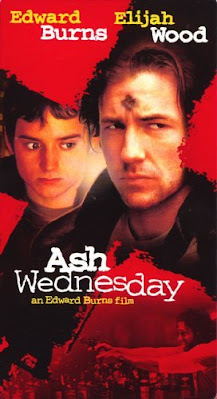 Don't judge a movie by its poster
Don't judge a movie by its posterThis is the completely expected ending. A, B, C—simple. It is the 90% ending as in most books and movies. They deliver on the set-up. Unfortunately, the set-up doesn’t always deliver on the outcome.
Ed Burns’ 2002 film, Ash Wednesday, follows all the numbers. Fran Sullivan, (Burns) is a Hell’s Kitchen bar-owner trying to keep his sister-in-law, Grace, (Rosario Dawson) safe as rumors swirl that Fran’s younger brother, Sean, (Elijah Wood) has “returned from the dead.” Fran’s conflict is in his love for his brother pitted against his love for his brother’s wife.
Anyone who’s seen a crime film knows how this goes. Still, the ending lands flat and not just due to the lack of chemistry between Dawson and Wood or the fact that Wood looks all of 14. No, the biggest part of the problem is balance. We don’t see Sean until the final third of the movie. All we know of Sean’s reason for “playing dead” is he stood up to the Irish Mob in the Kitchen, whatever that means. We don’t see enough of him in action to give RJS about him.
Fran on the other hand is running and gunning all over the Kitchen to save the two people most dear to him in the world. In the course of his efforts, we learn that Fan wasn’t always a bar owner and probably not the guy you want to be cross with on a dark street. But more than anything else, the audience sees a man who loves his brother dearly. Enough to give up the woman he loves just as dearly.
When we see Fran, after Sean and Grace are safely away. He has met his obligations, spiritual (denoted by the ash cross on his forehead) and familial. When he wipes the ash from his brow, we know he is at peace with his fate.
Yet, Sean and Grace, happy and safe, do nothing to balance Fran’s body, felled by a mobster’s bullet. It is an ending the story did not lay adequate groundwork for. As a result the sacrifice feels empty.
The subverted expectation is often the ending we need, not the ending we deserve
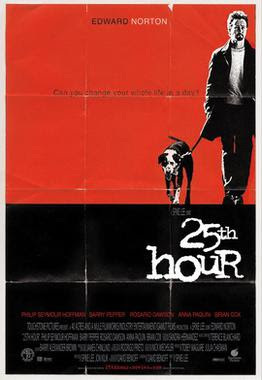 Upside, the dog lives
Upside, the dog livesAlso made in 2002, Spike Lee’s 25th Hour, is a study in subverting expectations. Note: I am discussing Lee’s movie and not David Benioff’s book because I really didn’t care about book Monty, book Monty’s friends, or book Monty’s stakes. I rooted for prison instead of book Monty.
Lee’s Monty, (Ed Norton) is a white drug dealer in NYC who’s been busted. He’s been convicted and sentenced to seven years. We meet Monty the day before he is to report to prison. Casting about for who ratted him out, for anyone else responsible, Monty gags on the “banquet of consequences” Robert Louis Stevenson wrote of.
Questioning his girlfriend’s loyalty, his friends’ loyalty, Monty weighs his own loyalty as the finality of seven years in prison and multiple vicious threats take their toll. And then, when he has exhausted every juvenile idea to counter his anxiety-fueled fear, Monty stands up to take his ride.
However Monty’s father offers to drive him out of the city and away from prison. Monty envisions his life. He can start over. Do honest work. He sees a future with his girlfriend.
But Monty remains silent and takes his ride to prison.
Lee's ending chides the audience for hoping and rooting for Monty’s privilege as a white male in America to prevail. He shows a possibility beyond the nightmare reality of prison and ruin that is completely out of reach for black, brown, and poor men. Monty, who is no longer who he was when his check came due, must still pay the price, just like everyone else.
This is a study in redemption and mercy and limited both are. This is the logical-conclusion ending, based on the opening scene and every moment of Monty’s growth beyond it.
Lee laid all the groundwork, the emotional basis, and the coffin-nails-hard reality of an ending where a privileged prick dodges prison. Then he executes a perfect fait accompli for Monty—who has grown and changed from the petulant, hand-in-the-cookie-jar dealer at the beginning—to stand up and do his sentence like a man, in atonement for what he has done to the people who care about him and for the audience that has become invested in Monty, his redemption and desperately wants his deliverance from hell.
Again, masterclass in story telling. If you haven’t seen it, do. Go-go-go, now-now-now.
Sometimes the girl gets the boy, or, the happy-for-who ending…
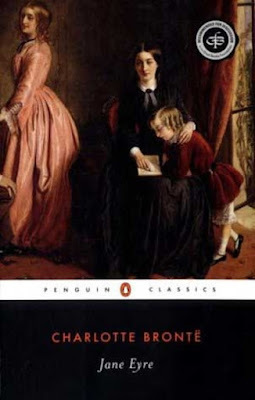 Seriously, though, what was that noise?
Seriously, though, what was that noise?Charlotte Brontë’s Jane Eyre has been through it. Raised in an orphanage that would give Dickens nightmares. Jane goes from waking up for daily abuse to working as a governess in a house with both food and heat but no warmth. Worse, there is something not quite... Wait, what was that noise?
If you haven’t read it, Jane Eyre is a classic of English literature for a reason. Dealing with class, religion, and sexuality, JE is a caustic critique of social mores that hobbled women to domestic indenture or marriage, (same/same?) and permitted men to violate major parts of the current criminal code with impunity.
So, it ends with Jane busting her boss, Rochester, in the mouth and running off with an age-appropriate Mr. Darcy stand-in, right?
Um, no. After a nightmare wedding day, Jane flees Rochester, Adèle (Rochester’s child), and his musty old house. Only to then return to Rochester—after hitting the family lotto. Finding that Rochester is now a widower, (seriously, read the book) she professes her love and intent to never leave his side.
This is not romance. It is horror. It works because Jane, (like most women of the day) was conditioned to suffering and abuse. It also works because it leaves the reader with the barest sense of how bleak a 19th century woman’s life was.
For how it revolutionized prose writing, JE is probably the most important work here. Seriously, read it. It will improve you as a writer if not as a human being.
If Karma were a person…
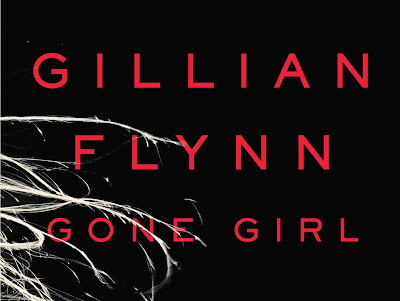
In Gillian Flynn’s crime masterpiece, Gone Girl, Amy Dunne has had it. She’s pregnant, dead, and her husband is not taking HALF the heat she expected. And, she maybemaybemaybe might be falling back in lo—oh, right, that second thing.
Amy, (after discovering that her husband cheated on her with one of his college students) faked her death to frame him up. Hilarity does not ensue.
If this reads trite, it is. Read the book. It’s not trite. It’s scary AF.
However, after watching Nick flail, confess, and attone in repeated news interviews, Amy becomes convinced that Nick does love her, realizes she’s the only one that can get him out of this mess that she he got him himself into.
So, as happens, somebody gotta die.
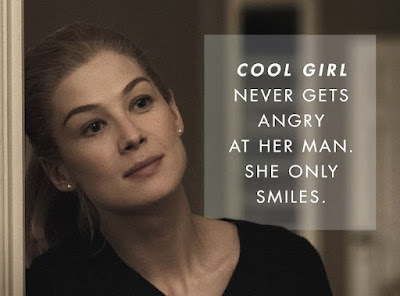 Believe that if you want to...
Believe that if you want to...In this case it’s Amy’s high school crush, Desi. Ever the perfectionist, she redirects evidence toward Desi, seduces him, and then kills him. Easy, breezy, covergirl, style.
Returning home in a hail of media gasps, Amy saves Nick’s as—sets, professes her undying love for him, and determination to never leave his side.
~Yikes~
Like JE, GG’s ending sings because of the groundwork put in by the author. Through conflicting accounts and an unfolding investigation, the reader finds, (right along with the cops) that neither Nick nor Amy are good people. While I hesitate to say they deserve each other, I will not argue with anyone who does.
Further, GG did for crime fiction what JE did for prose fiction and the Gothic Novel form. GG is a genre-breaking work that changed perspectives for a lot of readers and writers. And, after the film adaptation, a lot of men became a lot nicer to their wives. Or, you know, so I’ve been told…
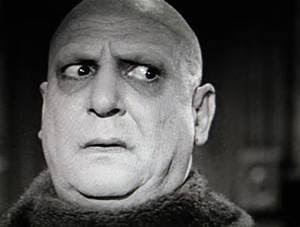 What was that noise?
What was that noise?So, endings. You want a paint-by-numbers—happy, sad, ambiguous—ending? Fine, just make sure your numbers line up. But if you want to subvert expectations, you will have to earn it. Your groundwork has to be meticulous and your protagonist MUST grow from where the reader meets them. The writer will have to guide the protagonist and reader through treacherous, shifting tides to that ending.
The biggest question for any ending (and whether that ending works) comes down to one question. Has the protagonist earned this ending?
I own none of the photos above. All are used for instructional/educational purposes as covered by the Fair Use Doctrine.
August 11, 2025
Fantastic Four First Steps and Why YOUR Story Matters

Those who have read my previous posts may recall that I’m a long-time comic book nerd. As, in “begged for a Spider-Man comic before I could even read,” comic-book nerd. With that established, it should come as a surprise to no one that I attended a showing of Matt Shakman’s The Fantastic Four: First Steps on opening weekend.
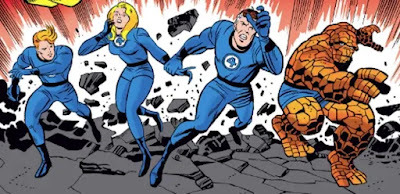 Marvel’s First Family, Jack Kirby's art/influence
Marvel’s First Family, Jack Kirby's art/influenceThe story of four individuals, (Reed Richards, Sue Storm, Johnny Storm, and Ben Grimm) forever changed by exposure to cosmic energy during a spaceflight, The Fantastic Four comic-book (here on, FF) debuted in 1967. The book represented an optimistic belief that humanity could think its way out of any challenge, The book also identified a key component to civil/societal advancement: family.
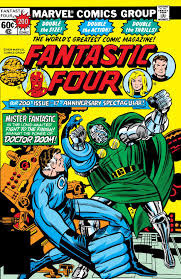 Love at first sight.
Love at first sight.It’s a great message but it wasn’t what first drew my attention to the title. Nine-year-old me was blown away by FF #200 and Doctor Doom, (with a passing resemblance to Darth Vader) going toe-to-toe with Reed Richards, (stretchy guy in blue). I had seen the title before as well as the old Hanna-Barberra cartoon series. But issue #200 was the one that caught my eye.
Exciting, with a scary villain. The action and resolution made sense. All rare things in comic book land. But there was something missing…
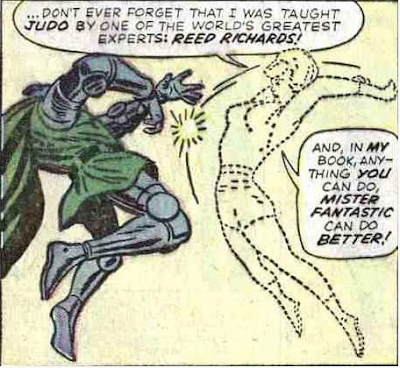 Her accomplishment, still has to praise husband ~sigh~
Her accomplishment, still has to praise husband ~sigh~Invisible who?
Comic books have always been imperfect and FF was very much an imperfect title of its time. Nowhere was this more evident than Sue Storm’s Invisible Girl (more on that).
As DCCreators, Stan Lee and Jack Kirby, gave Sue/IG short shrift. Much like other early Marvel heroines, The Wasp and Marvel Girl, The Invisible Girl was often written as the imperiled sidekick, or the imperiled weak-link, or imperiled romantic-interest.
Unfortunately, this (women as plot device) was par for the course at the time. And it remained that way for almost twenty years. When Sue stepped beyond the role of Reed Richards cheerleader or FF denmother, it was not through agency but through beauty.
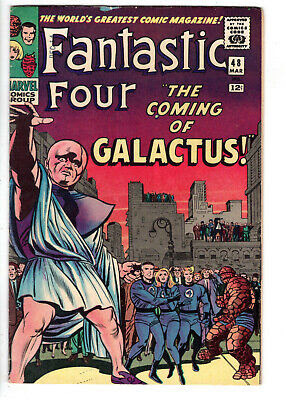 It was either Sue or dude in the toga
It was either Sue or dude in the togaSue did stop Galactus, (literally eats planets)...by turning Galactus’ love-struck herald, The Silver Surfer, against big G. When Namor, (the big-bad from Wakanda Forever) decides on war against the surface world, he first kidnaps Sue and then spends the next two decades trying to woo her. Dude really has odd ideas about courtship.
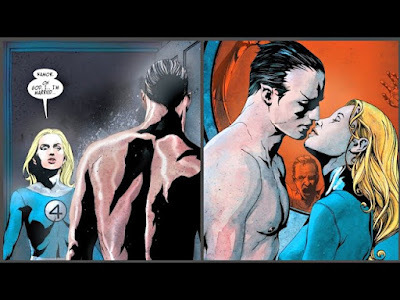 Sue, exercising her agency
Sue, exercising her agencyBut times change. Sales changes a lot more and much faster.
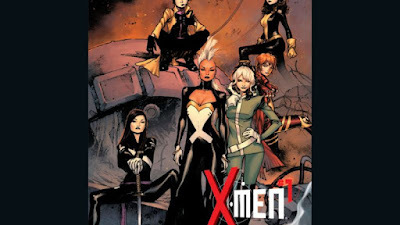 Disinclined to acquiesce to be imperilled
Disinclined to acquiesce to be imperilled
The X-Men comic book predates the FF by about four years. Unlike Marvel’s First Family, the X-Men struggled, was even cancelled and ultimately resurrected to shaky results. Then a new writer took over.
Chris Claremont had entirely different ideas about what comic books—and female characters—should be about. He punched up the female characters, gave them agency, (ideas, goals, fears, independent of men). As a result, in the course of about three years, The X-Men went from one of Marvel’s lowest-selling titles to the single most successful title in Marvel’s history.
And just in time, too
As cable television and video game consoles became more prevalent, (male) comic book readership declined. But female readership climbed. Women saved The X-Men and women saved comic books—especially as more women began to write comic books.
Which brings us back to Sue Storm in the movie. Screen writer Kat Wood, (et al) wrote a fully realized woman. Here, Sue is introduced as a scientist. She negotiates a peace treaty with a subterranean nation. Even addresses the UN General Assembly. Yes, she loves her husband and her family but she is more than wife, sister, and mother. She is a thinker and a problem solver, a nurturing peacemaker, and a valiant fighter.
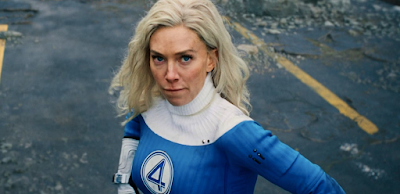 Like. A. BOSS.
Like. A. BOSS.Most importantly, Sue stands up to her husband as readily as she stands up to the villain. And by the time they get around to dealing with Galactus, Sue is good and over Reed and his sh—super intellect driven, near-pathological anxiety.
Sue takes charge of the battle plan and the unimaginable risk. And like the strongest heroes, she offers her very life for those she loves. For all that she loves.
This is why your story matters: perspective, experience, and imagination, beyond what has gone before. The damsel who saves herself, (Aria Stark in George R.R. Martin’s Game of Thrones series) the boss baddie who saves herself and the guy, (Inej in Leigh Bardugo’s GrishaVerse) and the woman of courage and integrity who stands on her own intellect, (Gaal in David Goyer and Josh Friedman’s Foundation)—we all want, NEED, those stories.
When you infuse the story with your dreams, fears, and insight, you give one of those 6 or 7 stories evolved life. Best of all, you give someone who needs that story a chance of seeing themselves in strength and light. That is what the best stories do.
The Fantastic Four: First Steps is a lot of fun whether you’re a fan of the comic books or not. I can’t wait to see it again.
Check it out.
I own none of the photos above. All are used for instructional/educational purposes, as covered by the Fair Use Doctrine.
The Fantastic Four and Why YOUR Story Matters

Those who have read my previous posts may recall that I’m a long-time comic book nerd. As, in “begged for a Spider-Man comic before I could even read,” comic-book nerd. With that established, it should come as a surprise to no one that I attended a showing of Matt Shakman’s The Fantastic Four: First Steps on opening weekend.
 Marvel’s First Family, Jack (the King) Kirby's art/influence
Marvel’s First Family, Jack (the King) Kirby's art/influenceThe story of four individuals, (Reed Richards, Sue Storm, Johnny Storm, and Ben Grimm) forever changed by exposure to cosmic energy during a spaceflight, The Fantastic Four comic-book (here on, FF) debuted in 1967. The book represented an optimistic belief that humanity could think its way out of any challenge, The book also identified a key component to civil/societal advancement: family.
 Love at first sight.
Love at first sight.It’s a great message but it wasn’t what first drew my attention to the title. Nine-year-old me was blown away by FF #200 and Doctor Doom, (with a passing resemblance to Darth Vader) going toe-to-toe with Reed Richards. I had seen the title before as well as the old Hanna-Barberra cartoon series. But issue #200 was the one that caught my eye.
Exciting, with a scary villain. The action and resolution made sense. All rare things in comic book land. But there was something missing…
 Can't even take credit for her won accomplishment...
Can't even take credit for her won accomplishment...Invisible who?
Comic books have always been imperfect and FF was very much an imperfect title of its time. Nowhere was this more evident than Sue Storm’s Invisible Girl (more on that). Creators, Stan Lee and Jack Kirby, gave Sue/IG short shrift. Much like other early Marvel heroines, The Wasp and Marvel Girl, The Invisible Girl was often written as the imperiled sidekick, or the imperiled weak-link, or imperiled romantic-interest.
Unfortunately, this (women as plot device) was par for the course at the time. And it remained that way for almost twenty years. When Sue stepped beyond the role of Reed Richards cheerleader or FF denmother, it was not through agency but through beauty.
 It was either Sue or dude in the toga
It was either Sue or dude in the togaSue did stop Galactus, (literally eats planets)...by turning Galactus’ love-struck herald, The Silver Surfer, against big G. When Namor, (the big-bad from Wakanda Forever) decides on war against the surface world, he first kidnaps Sue and then spends the next two decades trying to woo her. Dude really has odd ideas about courtship.
 Sue, exercising her agency
Sue, exercising her agencyBut times change. Sales changes a lot more and much faster.
 Disinclined to acquiesce to be imperilled
Disinclined to acquiesce to be imperilled The X-Men comic book predates the FF by about four years. Unlike Marvel’s First Family, the X-Men struggled, was even cancelled and ultimately resurrected to shaky results. Then a new writer took over.
Chris Claremont had entirely different ideas about what comic books—and female characters—should be about. He punched up the female characters, gave them agency, (ideas, goals, fears, independent of men). In the course of about three years, The X-Men went from one of Marvel’s lowest-selling titles to the single most successful title in Marvel’s history.
And just in time, too
As cable television and video game consoles became more prevalent, (male) comic book readership declined. But female readership climbed. Women saved The X-Men and women saved comic books—especially as more women began to write comic books.
Which brings us back to Sue Storm in the movie. Screen writer Kat Wood, (et al) wrote a fully realized woman. Here, Sue is introduced as a scientist. She negotiates a peace treaty with a subterranean nation. Even addresses the UN General Assembly. Yes, she still loves her husband and her family but she is more than wife, sister, and denmother. She is a thinker and a problem solver, a nurturing peacemaker, and a valiant fighter.
 Like. A. BOSS.
Like. A. BOSS.Most importantly, Sue stands up to her husband as readily as she stands up to the villain. And by the time they get around to dealing with Galactus, Sue is good and over Reed and his sh—super intellect driven, near-pathological anxiety.
Sue takes charge of the battle plan and the unimaginable risk. And like the strongest heroes, she offers her very life for those she loves. For all that she loves.
This is why your story matters: perspective, experience, and imagination, beyond what has gone before. The damsel who saves herself, (Aria Stark in George R.R. Martin’s Game of Thrones series) the boss baddie who saves herself and the guy, (Inej in Leigh Bardugo’s GrishaVerse) and the woman of courage and integrity who stands on her own intellect, (Gaal in David Goyer and Josh Friedman’s Foundation)—we all want, NEED, those stories.
When you infuse the story with your dreams, fears, and insight, you give one of those 6 or 7 stories new life. Best of all, you give someone who needs that story a chance of seeing themselves in strength and light. That is what the best stories do.
The Fantastic Four: First Steps is a lot of fun whether you’re a fan of the comic books or not. I can’t wait to see it again.
Check it out.
I own none of the photos above. All are used for instructional/educational purposes, as covered by the Fair Use Doctrine.
July 2, 2025
What Reading—And Reviews—Do for Your Writing

Like many writers, (I hope and pray to Yoda) I’m an intermittent writer. In snatches and grabs, I write pages at a time, (and ~sigh~ at times, a sentence or two at a time) amid loooooong stretches of nothing. In those long stretches I read. Fiction and politics, finance and poetry, cookbooks and comic books—I read it all.
Reading is the writers’ life blood. Without the works and words of others, we have nothing to aspire to. With nothing to emulate, we have nothing to become. And, without the occasional turkey, we have nothing to learn from.
When I first heard of Brad Meltzer and Josh Mensch's "The Nazi Conspiracy," the premise—a plot to assassinate the allied leaders—enthralled me. Even after hearing a historian's opinion that the book was more entertaining than historically accurate, I was undissuaded.
The good
There are a handful of really good character studies contained in the fast 335 pages. My reading on the Second World War is minimal. As a result, Meltzer/Mensch's accounts of the infighting within the Nazi Foreign Intelligence service, (SD) and more pointedly between SD chief Walter Schellenberg and Lt. Otto Skorenzy—complete with a desk out of a James Bond movie—is entertaining. No less so is the account of Skorenzy's mission to rescue Italian dictator, Benito Mussolini.
Equally, the delicate calculus that the three allies, President Franklin Roosevelt, British Priminister Winston Churchill, and Soviet Premier Joseph Stalen, used to align their pieces on a chessboard of friends and enemies is suspenseful.
The bad
Execution is where things bog down in Meltzer and Mensch's book. They have a habit of restating, indeed, reintroducing characters and conflicts. The previously mentioned "desk" scene would've been more riveting, (than entertaining) if M/M had simply trusted the reader to remember that Oberführer Walter Schellen had many enemies, foreign and domestic. Instead they rehash from 20 pages earlier.
"Mike Reilly is on another plane. He's been on a lot of them in the past two weeks, almost too many to count. He's also been on quite a few boats, trains, trucks and jeeps..."
But it's not just the restating. M/M's prose run to clunky and promote eye rolling (if not pained squinting) more than drama or tension. Lines like the one quoted above would embarrass a pulp author. Further, I struggled with the constant jump in tenses (past, present, who-knows).
The ugly
There really is no ugly here. The violence is reported, (when reported at all) in journalistic detachment. It's all quite benign with nothing explicit. The book is fine, not great, no terrible, just fine.
The benefit
Reading a mediocre book is not a wasted effort. Ideally, you see what works and what doesn’t. However the best way to really understand both, is to review the book. By dissecting the book, for the well done and the undone, you get a better idea of how and how-not to write your own story.
Another upside to a less-than-great story is the desire to find something that does work for you. As I write this I'm 220 pages into Jon Meacham's analysis of President Lincoln, And There was Light. Meacham also provided a cover blurb for The Nazi Conspiracy, so this is not a out-of-left-field comparison. More historian than dramatist, Meacham gets the first commandment of telling a story—any story—thou shalt not get in your story's way.
In their closing, Meltzer and Mensch note that there have been scarce attempts at telling this story and their aim was to write the definitive take on this event. They had an embarrassment of riches to work with. As a reader, I simply wish they had a more exacting editor.
The Nazi Conspiracy is a work of historical fiction, (my opinion) complete at 335 pages. Check it out, take notes, and get cracking on your own story.
Buona fortuna.
The photo at the top belongs to the author and is used by his very kind permission.
June 2, 2025
Daredevil Born Again and Why Bait/Switch Writing Sucks
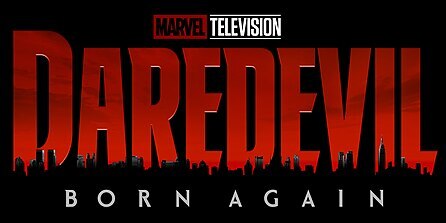
In 2005, I found Duane Swierczynski’s The Wheelman, on the “staff’s pick” table at Murder by the Book. A love letter to Donald Westlake’s Parker novels of the 60s and 70s, TW sprang out of the gate running and gunning with thoroughly contemporary sensibilities.
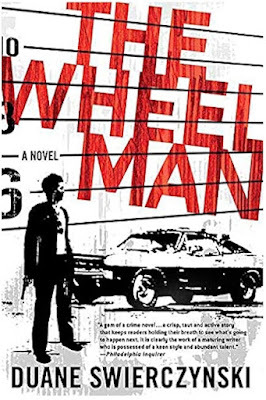 Obviously, looks can be deceiving
Obviously, looks can be deceiving
Lennon, the titular wheelman, is as enigmatic as he is brutal. The plot is threadbare and the setup for conflict is see-Spot-run simple. All fitting a sparse crime story where the grit is the point.
Infact TW is nearly perfect. Until the last chapter. That’s when we learn that the preceding 230-ish pages were all just a setup for Swiercznski’s REAL protagonist—who you can read more about in the next thrilling novel…

So, Daredevil Born Again…
Like the Parker novels, Marvel Comics’ Daredevil (aka Matt Murdock) has a long-standing place in my heart. I began reading the title in 1981 but as Marvel does, I knew of the character for years from Spider Man crossovers. Issue #174 was the first full Daredevil comic I bought and it was a brilliant introduction as well as a rocket-ride of action. I was hooked.
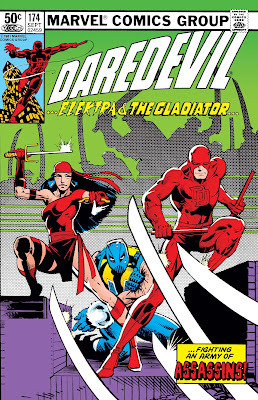 Delivers everything the cover promises
Delivers everything the cover promisesThe story of a man blinded in adolescence by radiation exposure, Daredevil, becomes a masked superhero. See, the same isotope that blinded him also gave young Matt some phenomenal abilities. A hard-nosed mentor trained him up from there in all manner of combat.
Yet it’s a history of violence and injustice that really drives Matt Murdock, public defender by day, to become the Devil of Hell’s Kitchen, (a NYC neighborhood) at night. Those books, (about four years of monthly publications) written by Frank Miller, are considered some of the best ever written. Those stories have influenced writers and directors and more than one actor.
“The thing about Matt Murdock is, he's not saving the world. He's just keeping his corner clean.” Drew Goddard, creator and showrunner, Netflix’ Daredevil
Thirty-ish years later and Hollywood was finally figuring out what to do with comic book movies that didn’t feature Batman or Superman. And some folks at Netflix rolled the dice on Drew Goddard’s adaptation of Daredevil. The show was a hit with fans and newbies-alike. That success resulted in a string of other Marvel properties (Iron Fist, Luke Cage, Jessica Jones) debuting on Netflix.
All good things…
Disney acquired Marvel Entertainment in 2009. With the success of movies based on Marvel Comics’ titles Iron Man, Captain America, et al, the MCU (Marvel Cinematic Universe) moved to bring all the titles back under their own roof. As a result, Marvel chose not to renew the Daredevil collaboration with Netflix.
Who knew it would take the MCU seven years to produce an original Daredevil series—only to botch the rollout?
First the good. Charlie Cox is back as Matt Murdock/Daredevil. I cannot imagine a better choice. Cox plays Murdock’s barely contained rage against his deep catholic angst with nuance and tremendous humanity. An understated actor, he does a LOT of dramatic heavy lifting with minimal effort.
Likewise, love-interest, Karen, (Deborah Ann Woll) best-friend, Foggy, (Elden Hensen) and criminal nemesis, Fisk/Kingpin, (Vincent D’Onofrio) are all back. Some for less time than others.

Then we get to the bad. Caveat: almost all of the following is second-and-third-hand information. Now, according to sources, one of the myriad series delays was due to reshoots over the tone taken by the new showrunners. Apparently someone thought, “less comic book, more legal comedy” would be television gold. A comparison to 90s TV show Ally McBeal was thrown around.
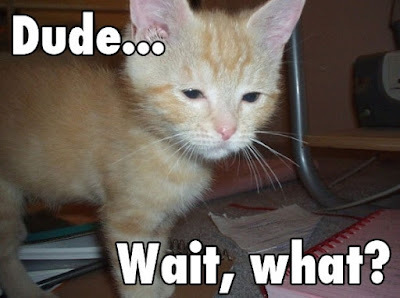
Fan favorites, Karen and Foggy, allegedly killing both beloved characters off-screen. Blame budget. Blame new directions. Mostly, I think you blame the showrunners who didn't understand what they were working with.
Ultimately, those really not-good plans were nixed. Photos were "leaked" showing Karen and Foggy on the set for DBA. In fact the series opens with Foggy at Josie’s bar celebrating an impending victory. Matt and Karen are present and in good spirits. All appears right with the world.
It’s all short lived.
Foggy is gunned down eight minutes into the episode. Matt, after subduing the killer, removes his mask, screaming into the night sky at the 15-minute mark. Karen leaves Matt, New York, and the show 20 minutes in. The rest of the episode is aftermath with Matt’s new legal partner, Kirsten, (Nikki James) and private investigator, Cherry, (Michael Johnson) all but babysitting a shell-shocked Matt.
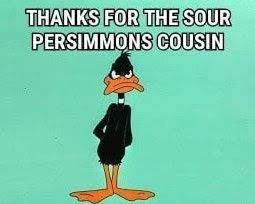
And that’s what is missing from DBA. More than Foggy’s pragmatic sensitivity or Karen’s compassionate conflict with Matt’s choices, what is missing from DBA is menace. The Netflix series was poor and hungry. So were the subjects. Matt can only afford the rent on his tenth-floor walkup because of a massive liquor sign right outside his window. He barely has a bed. It’s certainly implied that if not for the deli that Foggy’s parents own, both would starve.
Indeed, the lawyers are always one step from losing their office space for lack of rent money. In every other episode, Josie threatens to cut the boys off for their unpaid bar tab. Most delicious of all, D’Onofrio’s Fisk/Kingpin looms over every endeavor like the shadow of death.
By contrast, DBA’s Matt lives in a fully furnished mid-town apartment—with lots of natural light and airy-space. Matt and Kirsten’s office suite has a conference room. No one is scared. No one is hungry.
As a result is a season of forced conflict. The will-he-won’t-he put on the suit and resume the good fight, is only slightly more engaging than the empty relationship conflict between Matt and new love-interest Heather, (Margarita Levieva). A psychologist who is, ironically enough, providing marriage counseling to the Fisks, (Kingpin and wife) Heather is not credible as the love-interest—the relationship is rushed and feels as contrived as the main conflict—or therapist, who is duped into a blind (puns) date.
It’s not terrible, it’s just not-great with a lot more zeros behind it.
Subverted expectations can be fun. Having seen the John Boorman movie Point Blank, (one of several based on Westlake’s pinnacle pulp publication) I read with the absolute certainty that Parker would end up gut-shot. However, in the book, the double-crossed heister lives to steal another day. Westlake's story rewarded me with delight.
But nobody likes their HARD earned reading time wasted on 230 pages of backstory for a character that is barely mentioned. Maybe it's just me. Swierczynski has written several other books and penned several Marvel titles as well.
Daredevil Born Again feels like Swierczynski’s work and not in a good way. I may yet check out the 2nd season. If I do it will be with managed expectations and a short attention span. Few writers get the opportunity to burn my time twice.
Check out Daredevil Born Again, your experience may vary. Buona fortuna.
I own none of the photos above. All are used for instructional/educational purposes as covered by the Fair Use Doctrine.
April 15, 2025
From Where? Regional Bias and Character Establishment

In celebration of March Madness, Tonight Show host Jimmy Fallon debuted a witty little rap recognizing 15 teams in the “Sweet 16.” You read that right, 15 teams in the “Sweet 16.” Even incorporated 15 team mascots. In the “Sweet 16.” If you doubt me, you can see it here.
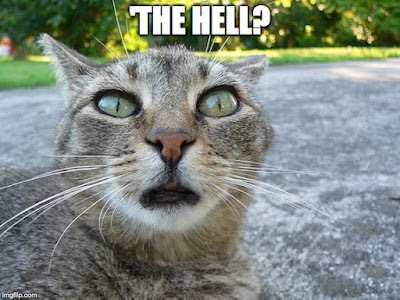
Really, it's not that surprising. See, the 16th team is the University of Houston Cougars and this omission of recognition is not an isolated incident for my beloved city.
The Houston Comets, (RIP) professional women’s basketball team, won the first WNBA championship. It’s like they didn’t even exist nationally. Perpetual underdogs, the Houston Rockets won back-to-back championships and it took (local) media outrage to compel Sports Illustrated to publish a championship edition. The Houston Astros have won two World Series—both times against teams with multiples of the Astros payroll. Crickets
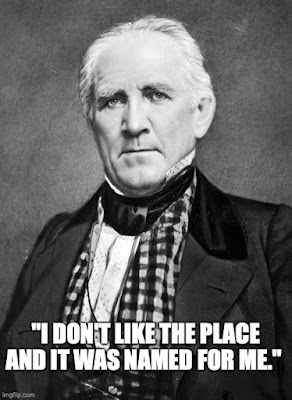 This is known fact, oh, and Sam Houston.
This is known fact, oh, and Sam Houston.
The fourth largest city in America, Houston is more diverse than Los Angeles and NYC, (Migration Policy Institute, 2023). But that’s not what we’re known for. Not our college communities, (we have five universities and over 40 colleges) or diverse employment opportunities, or sports teams, either.
See, for most outsiders, (means “me”) if you say “Michigan,” they/I think “Detroit.” Nevada is Las Vegas. New York is the five boroughs. Conversely, if you say “Dallas,” or “Austin,” or ~sigh~ “Houston,” most outsiders hear one thing: Texas.
 Only (ever) a selling point in Texas.
Only (ever) a selling point in Texas.
It might be the weather: hot with brief periods of freezing or drowning. It might be the time difference. You set your watch back 25 years when you come here. It might be our geography: far, we’re far from everywhere. It may be our economy that is largely built on high gas/heating oil prices, pain, and suffering. But mostly, it’s just Texas. We're really hard to love, by folks who entertain critical or self-reflective thought.
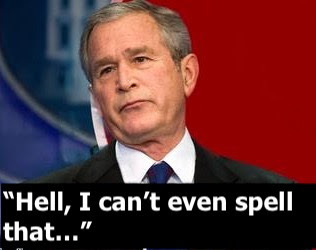
What’s this have to do with writing?
Regional biases can round out your protagonist/antagonist personality and character. There’s a long tradition of regional “attitudes” fleshing out a character.
 "Do I look like I'm Reseda?"
"Do I look like I'm Reseda?"Every dramatization of playwrite, poet, and duelist, Savinien de Cyrano de Bergerac—from Rostand’s play to every successive film—has depicted Cyrano as a gregarious, boisterous, and pugnacious Gascon. Gascons, (closer to the Basques than the Parisians) were the “bamas” (bumpkins, hicks, yokels) of France. It really butches up the world’s most famous unrequited lover.
Yet, in the greatest of writing traditions, Rostand stole the idea of the head-strong, fearless, and guileless Gascon.
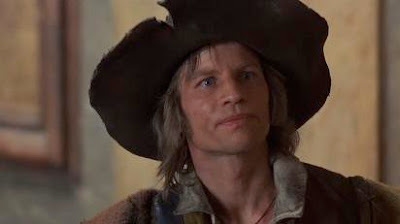 Yep, 'bama...
Yep, 'bama...
Alexandre Dumas first used the bama-hero for his do-right man, d’Artagnan, the world’s most famous musketeer. He is the mold for generations of heroes born of meager—but proud, ig’nant, strong, dumb, I can go on—beginnings who stand up to the sophisticated but ultimately corrupt villains.
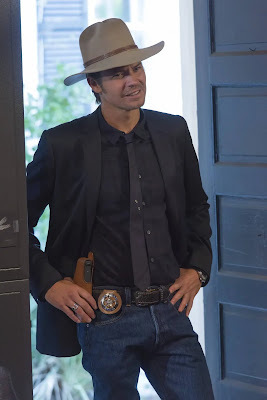 Maybe it's just about hats...
Maybe it's just about hats...Raylan Givens, Elmore Leonard’s U.S. Marshal from the mountains of Kentucky is a contemporary example. If you’ve never been to the mountains and valleys (hollers) you have an idea of the folk who live there from other books and movies. Same when Hannibal Lecter tells Clarice Starling (and I paraphrase, badly) “Good nutrition has given you some length of bone…And that accent that you’ve tried so hard to shed? That’s pure West Virginia.”
The mountain people of the eastern United States are known as recalcitrant nonconformists. They are the spiritual descendents of the afore-mentioned Basques and closer to the indomitable Spartans than the southern colonels and dixie princes. These points of origin lend a gritty toughness as well as a baked-in backstory of desperation with minimal exposition.
But why should the good guys have all the fun?
W.A.S.P. (noun) an acronym which stands for White Anglo Saxon Protestant. Considered the first enduring colonists of the north-eastern United States. Most commonly associated with New England.
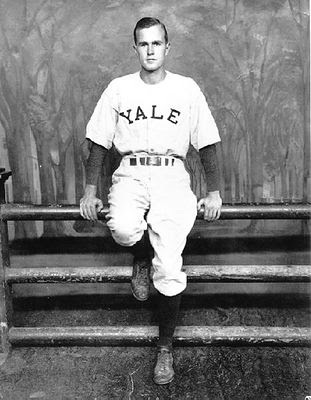
Also, almost immediately a villain. Why? Oh, regional-specific terms like “old money,” and “triangle money,” and "prep-school." Kidding! Mostly...
Then there’s the middling-guys. Not good, not bad, just meh-guys. You want to paint a picture of them with just a few strokes? Give them a point-of-origin identity.
There is however, a thin line between cultural identities and stereotypes.
For several hundred years, the (penny-pinching) Scot and the (ignorant/lazy/dishonest, I can go on) Irish were the ne’er-do-well butt of most English jokes. For several decades it was the (dumb) Polish in the north-eastern U.S. (as well as a certain Tennessee Williams' play) the cajuns in Louisiana, the Aggies in Texas, and the Texans everywhere else.
We’re the perpetual bamas and every year, in ways large and small, we perpetuate the stereotype.
But please remember, in all instances, we’re dealing with living breathing people. If you find yourself slipping into invective or hurtful stereotypes, just remember the Cougars.
A whole team of hard-playing, kids from all over the country entered into the NCAA’s March Madness in University of Houston Cougar jerseys. They made it all the way to the end. For their trouble, the national press only mentioned them in reference to the Florida Gators—who defeated them in the championship final.
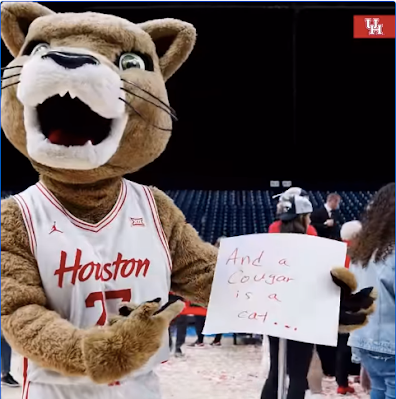 Shasta stating facts
Shasta stating factsI own none of the photos here. All are used for instructional/educational purposes as covered by the Fair Use Doctrine.
January 28, 2025
Carrie Fisher: Cool Kid, Writing Guide

Somehow, the anniversary of Carrie Fisher’s death, December 27th, slipped past me. It’s hard to believe that she’s been gone almost 10 years. But then that would be how Carrie would want it.
No movie-star, (that was her mother, Debbie Reynolds) nor especially attention-seeking, (her father, Eddie Fisher’s kink, not hers) Carrie went into the family business with the enthusiasm of a latent introvert. In truth, she often said that if she knew the fame that would come with her role as the iconic Princess Leia Organa, she would’ve gone in the opposite direction.
More comfortable in support than spotlight
If that seems like BS, consider that her supporting roles far exceed her lead roles. For that matter, her writing credits exceed her leading roles. Further, you need to read Carrie’s writing to know that she had a low-tolerance for Hollywood’s games.
That bedrock candor might be her greatest appeal. More than her looks, her wit, (both meanings of the word) stood out like a nova among lesser stars. That sharp intellect and cutting delivery cut through a lot of BS.
Smallest one in the room, makes the most noise
My sister took me to see Star Wars when I was 8 years old. I did not want to go. I preferred television where you could change the channel, get a snack, or take a bathroom break at will.
Plus, at that point, I had been to two movies. My first foray was For the Love of Benji, (where a dog was kicked and I lost my sh—tuff). Then, Bambi, (if you know, you know). Still, I idolized my sister and if she wanted to go to the movies, to the movies we went. But, yeah, less than thrilled.
Then John Williams’ score blasted over the speakers followed by that opening crawl—reading in movies was new to me and I loved it. By the time I saw the Tantive IV, (Princess Leia’s spaceship) rocket across the screen I was fully hooked. And then the funniest thing happened.
After we meet our big-bad, (Darth Vader) we meet the most unlikely hero ever, Princess Leia, (Carrie Fisher, duh). In the first five minutes, this short chick with ridiculous hair gets into a gun fight, gets shot, and then gets mouthy with the 7-foot-tall-walking nightmare. Seriously.
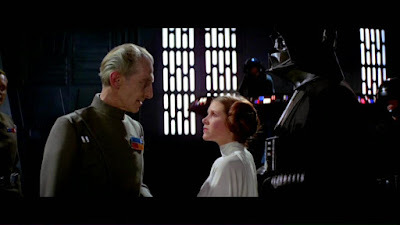
“...you and the space station you rode in on…” -Princess Leia, if written by Carrie Fisher
Leia takes no sh—tuff and gives no fu—oolishness. Even after they throw her in the brig, even after they torture her, Leia proceeds to tell Grand Moff Tarkin, (Peter Cushing) off. She is not stinting with her opinion of her so-called “saviors,” either. That’s a bad girl.
Yeah, yeah, the bikini.
Sure, Star Wars creator George Lucas, (et al) “softened” Leia up in the sequels. He also completely betrayed the character in the final installment. Still, Carrie’s intellect and cutting wit elevated Leia above stock, damsel/love interest/objectification character. There was no dimming her shine.
Carrie spoke and wrote of the sexualization/objectification she endured. She also took her agency back from the men who attempted to lock her down, put a leash on her neck, and a muzzle on her mouth.
When asked about the action figure of Leia in the bikini, collar, and leash—and whether the action figure should be discontinued, Carrie replied, “I think that’s stupid. The father who flipped out about it, ‘What am I going to tell my kid about why she (Leia) is in that outfit?’ Tell them a giant slug captured me and forced me tot wear that stupid outfit, and then I killed him because I didn’t like it.”
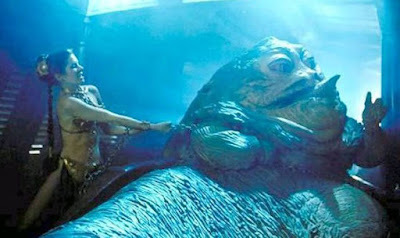 Eff'd around and found out
Eff'd around and found outThat’s who Leia was to me. Not a romantic (or sexual) object. Leia was that one cool girl in the neighborhood who liked Star Wars, knew the lore, and played right along with the boys.
Maybe it was because I was only 8 years old when I “met” Leia. Yet, I felt the same way at 13—around the same time Pam Grier carbonated my hormones, (different story, different time). I felt the same way through every Leia story in the extended universe. I feel the same way now.
As a result, I fell right in with Chris Claremont’s depictions of women in the X-Men comics and later with Frank Herbert’s fremen and Bene Gesserit in Dune. Like Leia, Storm and Lady Jessica, (among hundreds of others) had their goals, fears, and histories, independent of the men. None of them needed men to rescue them.
POV matters
And no one had to explain “agency” to me. Carrie Fisher had demonstrated it. It still makes me laugh when I read/hear a “strong” woman/women descriptive. Or, when women are rendered with their own agenda, are somehow heroic, (or evil, you know, whatevs…). While men doing the same bit are referred to as “Carl,” or “Bob.” I imagine Carrie rolling her eyes.
The women in my stories are strongly influenced by Leia. Not all of them are as smart or capable. A few have her courage. Many of them have Leia’s (Carrie’s) biting wit But none of them are set pieces for manly-male motivation, romance, or rescue.
Nevaeh Bailey, my drug dealer-turned heister, has Leia/Carrie’s tenacity and a good deal of her family baggage. Leticia Ruiz, my banker-turned money launderer has Leia/Carrie’s pragmatism and predilection for the worst men. Neither are sitting on a shelf, waiting for a man’s story to intersect with theirs.
Killing their own dragons and dragging them home
Carrie, through roles and written work, continues to shape my ideas of writing women. And her voice is one of the guides in my head when I write women characters. I strive for the immediacy in Carrie’s acting and the honesty of her prose.
Both are lean and to the point. If you haven't, you should read Postcards from the Edge, Surrender the Pink, and Wishful Drinking. Aside from the writing gold of a confident woman writing her truth, all three are FUNNY. You've seen/heard her dialogue in movies like Sister Act and Leathal Weapon 3, ironically enough, Carrie specialized in women’s dialogue.
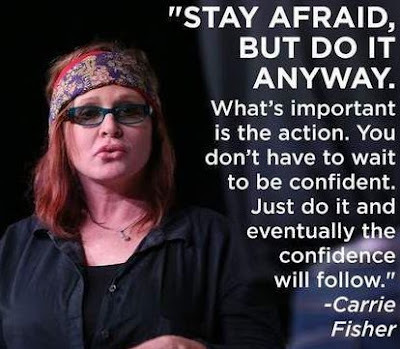 As in writing, so in life, or something...
As in writing, so in life, or something...Yet this idea, of reading women writers, extends beyond Carrie Fisher. It’s no secret that many men write women very badly, while most women write male characters with considerable validity born of years in study of male authors. Guys can and should do better. No matter your genre, you will find a woman killing it and by reading those women, you will improve your writing.
To say I’ve been a Star Wars fan ever since is a huge understatement. The only love affair that comes close to my love of Star Wars is my love of reading. And that is where my love for Carrie Fisher truly blooms—in print. If all you know of her is her acting, you truly haven’t seen her best side. Trust and believe.
Carrie Frances Fisher died in 2016 at the age of 60. She graced the screen in 95 productions, left us with four novels, four non-fiction works, and untold ministrations as a script doctor. It was nowhere near enough time nor enough of her insight. Thanks, for the laughs, Carrie and for teaching us new ways to play the game.
I own none of the photos above. All are used for instructional/educational purposes, as covered byt he Fair Use Doctrine.
January 8, 2025
Life Beyond X, a Recap

A while back, I decided to leave X, (the platform formerly known as twitter). At that point, I’d been on twitter for eleven years. Elections and presidential administrations, PitMad and WriterWednesday, I played and participated in 140 characters, (280 in the last couple of years). Along the way, I made friends, like 18K friends.
“It’s money that matters,” -Randy Newman
But twitter had the most friends—368 million users in 2022. And, what started out as a meet–and-hang-out spot, (but online, where you don’t have to put on pants) turned into an underperforming business venture. But hey, who builds a wildly successful social media platform with international reach and doesn’t take care of it? I mean the guys a genius, right?
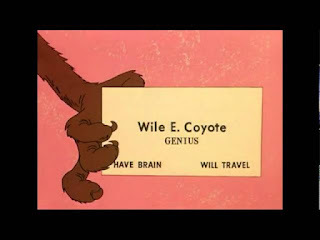
If all you knew of Musk was his dollar-changing hustle or death wagons or his rocket racket, you’d think textbook Austin Powers vil nerd. However, Musk is also a child of brutal privilege who has never suffered real consequences, (means “eat his own words” at a minimum) for ill-conceived schemes. His (purportedly) drug-fueled ego was the worst possible tone for one of the most influential platforms on the globe. But, yeah, money talks.
Moving on…
At the time, the big question for me was not “if?” I don’t do white-supremacy, vile misogyny, or LGBTQ-hate. So, it was only a matter of time until I noped out of that…morass.
Still, the work of writing is solitary and writers need community or discouragement sets in. My own work drives me but the work and success of others inspires me. So, once a week I engage in a promotion for writers called #WriterWednesday.
I do a blog crawl, (sharing links to blogs I find informative, topical, or just of interest to writers). Additionally, I promote fellow writers with new books, poems, or posts, and I post memes. So many memes.
Somewhere in there, I also promote my own posts. Yeah, it’s a lot but I don’t get out much and it’s cheap entertainment. Big lag between those MCU events, yo. But where to go?
We’ll look at my initial assessments and my one-year-ish-later results.
First, the non-starters.
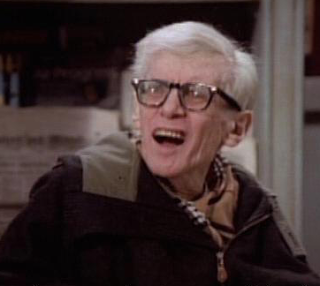 Probably not my junior high school yearbook photo.
Probably not my junior high school yearbook photo.HIVE Social is a mobile-only app. I can barely see my phone, much less use a small-screen interface. So, it may be the greatest thing since coleslaw and cottage cheese but I’ll never know it because I can’t see it.
Facebook, great for posting your lunch photos, your vacay photos, but for promoting writing and writers, it’s the equivalent of your mother telling you that your book “is very nice,” and she likes it.
Without furhter delay, the contenders...

Then: I’ve been on Instagram for years, I only just figured out how to post something to the platform. It is still limited, (you can’t post a hyperlink). Hard pass.
Now: Same ol’ same ol’... I post some of my memes there but not often. It’s still clunky and the new “Post or AI” option continues to annoy me.

Then: Lots of early buzz for Mastodon. No waiting list, no invitation necessary.
Downside: it is a community of special-interest silos. You stay in your writer silo (or political silo, or music silo) or you have multiple user profiles.
Now: I dropped off after about eight weeks, (hours?).
The platforms that made the cut.
Counter Social:

Then: They have the right ideas. It’s easy to sign up and the community is strong with a lot of good-hearted interaction. Posts are up to 500 characters, with hashtags, links, and polls. While mostly user-friendly, the interface is BUSY. Every square cm of real estate is in play and it can feel claustrophobic.

Downside: did I mention three columns? One column is the main feed, in real time, the second is friends/follows posts, and the third is your notifications…I think. If not apparent, you will still likely miss notifications, replies, etc.
Now: I dropped off CS after three months, went back, and then dropped off for keeps two-months later. My stats are underwhelming to say the least: I made 1K posts, followed 280 people, and I got maybe 140 followers. Not terrible, not great, not enough interaction for the time I tied up in it. Your results may vary.
Post.News:

Then: while Post News is not as polished as CS, the interface is simpler and closer to twitter. There is no character limit. There is some kind of points/money thingy I have yet to understand.
Downside: PN is still a bit buggy. It may take two or three attempts to post something, especially with a link. More than once I simply could not share a link/post at all. The notification alerts are not ironed out yet. Notifications I saw—and cleared—in February still show up as new but none of that is a deal-breaker.
Now:
“Post News” is just that—news. Ninety-percent of the folks are there to discuss news. There is very little writer-interplay. My Writer Wednesday antics found NO traction. Like, at all. Ever.
I dropped off after two months. For 800 posts, I followed 130 people, and have 80 followers. I’d say PN is not my bag but I think it’s the other way around.
Blue Sky

Then: Jack Dorsey headed up development on bsky and therefore the interface is the closest to twitter. It is very user friendly. The character limit is 300 which is more than generous.
Downside: There can be a lag for your posts to show up in your profile/log and a longer lag for notifications. The engineers didn’t add hashtags, (which hampered building communities around an activity or event, e.g. #WriterWednesday) until August-ish.

Now: Traction was slow at first but growth is steady as more human beings leave Xitter to the toxic. In the ten months-ish since I joined, I’ve made 3K posts, followed >600 people and have almost 1K followers.
All-in-all, bsky is a good alternative to X.
Threads:
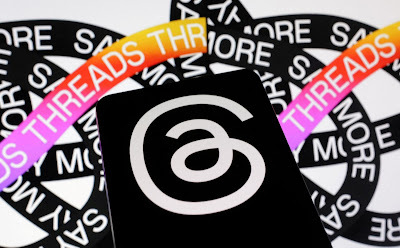
Then: Threads is the least like twitter, fitting as the platform was developed by the folks behind Instagram. With that stated, the interface is clean and simple to use with 500-character posts, hashtags, and links.
Upside: if you’re on Instagram, everyone who follows you there will follow you on Threads. There is even a handy toggle to move between Instagram and Threads.

Now: The writing community is civil and supportive. I have engaged with a number of writers. I’ve also discussed politics, movies, and food. The King is there now, too.
I’ve made, probably, >2K posts. I follow >600 people and >300-ish follow me.
Downside: some of the more and more…passionate elements of twitter have found their way there and bringing some of their crappy behavior with them. But the community is strong. The writing community is growing by leaps and bounds.
I enjoy my time on Threads and I continue to post.
Spoutible:

Then: As they say in the Army, Spoutible is easy to use, easy to clean. Like bsky, the interface closely resembles twitter with a 300-character limit. The notifications are relevant and near real-time. The community is diverse and I’ve had the greatest interaction here with both new authors and even some of my old schoolies from twitter.
It’s not perfect. The upgrades are not entirely seamless but don’t impede use. You have to click-to-post photos, (no drag-and-drop). Additionally, seeing your responses often requires refreshing your screen.

Now: I’ve made >3K posts, I follow >700 people, and >800 people follow me. However, the interactions are the greatest reward—and still the biggest surprise. Writers, politicos, fandom, there is a lot of feedback on just about every front I’m invested in.
Tone means a lot so does mature responsibility
Spoutible founder, Christopher Bouzy is engaged and active on the platform but not as…inescapable as Musk is on X. Mr. Bouzy’s enthusiasm for discourse permeates the platform and the tone is optimistic. I have not seen the same Xitter ~ahem~ “detritus” on S as on other platforms.
Obviously, I’m not going anywhere.
I may explore other platforms but with a new understanding that replacing a social media platform is just as easy (or as hard) as finding your people. Twitter is gone and honestly, it wasn’t the thoroughfare of ideas we presumed anyway. We were. We are and we take our ideas with us.
 Just between us, I think that ship has sailed.
Just between us, I think that ship has sailed.Musk is late to the fact that he owns the platform, not the people.
The sooner we accept that, the sooner we can build (or build upon) something better. BTW, if you want to connect, I'm EliasJMcClellan on all the above evaluated platforms. Stop by on Wednesday and we'll talk books, or any other day and we'll talk cats or Star Wars or something.
I have no further need to discuss "X." It's done.
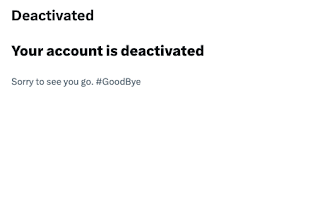
I own none of the images here. All images are used for educational/instructional purposes as covered by the Fair Use Doctrine.
December 18, 2024
Driving Nikki Giovanni—A Princess (among paupers)
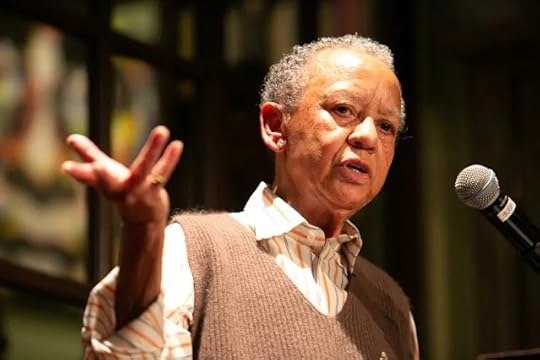 Nikki Giovanni by Mark Mahoney
Nikki Giovanni by Mark Mahoney In the early 0’s I drove a limousine to supplement my meager, state-employee wages. More than just the extra jingles, I found refuge in mindless driving that evaded me in writing. Town car work, airport runs, and events—it got me out of the house that I made hostile.
Of all the work, I preferred the town car—short trips and short money—to the stretch limo and orchestrated chaos of prom season. Yoda, save me from bachelorette parties. And fuck me if I wouldn’t rather drive a funeral than a wedding. Neither “party” tipped so why not go for the better behaved, if not happier one?
Mostly, I simply took comfort in driving. Mirror, speed, temperature, mirror. Check the distance from the car in front and behind. Watch for drunks and street racers. Most people didn’t care to chat or they did, it was basic info.
Where is the nearest liquor store to the airport? Can we stop at Taco Bell on the way?
Easy money.
My dead-end job? The agent who stopped returning my emails? The fellow crit-group member who landed my dream agent? The QueryTracker buddy who published a best-seller right out the gate? All in my rearview mirror.
Airport to the hotel, hotel to some conference, conference to the bar—and back again—I drove. They didn’t have to hustling for a cab, (Uber was still a novel concept) or ride in a rickety rental with that one creepy coworker. I got paid, no thinking involved.
That money covered my part of the bills for the month. The part of the month that my state pay did not, could not, never would cover. There was usually enough to also cover my smoking and book habits. It was a good side-gig.
Jafar, my boss, only had slim prospects for me that weekend. There was an early-AM, hotel-to-airport run. Then an airport-to-mini-mega church trip in the middle of the day. Jafar offered a 50/50 split on the both runs to cover the dead space and since xians don’t notoriously don’t tip.
N. Giovanni
By 3PM, I arrived at IAH, (Houston Intercontinental Airport) crazy early and drew up my sign. Then I saw the name on my airport manifest. I did honestly laugh at the very idea of a world famous poet coming (voluntarily) to Houston. Imagine my utter shock when Nikki goddamn Giovanni, walked up to me in the C terminal of IAH, to claim her driver.
“Jesus Christ, you’re Nikki Giovanni. I cannot tell you how honored I am to get your bag…”
Of course people stared at my bumbling. If Nikki Giovanni was embarrassed by my fanboying, I couldn’t tell it. She dealt with my yammering, the blast of swamp-heat between the terminal and town-car parking, and then the long drive into town with the same placid, above-it-all demeanor.
I struggled to understand WTF happened to my professionalism. At that point I had driven some D-list celebs, a reality TV “star,” a couple of athletes, and at least one rapper. They were clients just like the engineers in town for the OTC or the pimply-faced kids going to prom. I uttered not a “peep” to them unless they asked a question.
But none of them were poets. None of them were poets I had read. None of them wrote work that sparked my imagination.
“So, you know my work or just my name?” She asked once we exited the IAH slalom for roads that made sense.
This time, I metered my breathing and response. “Those Who Ride the Night Winds, was one of the books that saved me from going full-on-non-verbal despondent while living in redneck hell.” Realizing that I could only cite one of her books, I qualified. “My Missus has Spin a Soft Black Song, Ego-Tripping, and Vacation Time, from when she was a kid.” And I buttoned up, professionalism restored.
Then she asked me who else I read. All professionalism went out the window and it was as if I no longer needed to even inhale as I vomited all the books and authors that mattered to me. Somewhere in there I mentioned how I had been scribbling since I was 13 or 14 but meeting Walter Mosley, talking with him, had spurred me to actually finish my first novel.
In my cursory glance at the rearview mirror, I saw Nikki Giovanni smile. “Isn’t Walter great?”
Dumbfounded, I nodded. I could not call him “Walter.” You don’t call Marcus Aurelius, “Marc” or William Faulkner, “Bill.” He was Walter Mosley, both names together ideally, in reverence. Otherwise, it would be like calling god by her first name.
Holy shit, did I just say all of that out loud?
Apparently, I did because Nikki Giovanni sighed in glad-it-wasn’t-me delight. After a few minutes she spoke, really more commiserated, about writing and writers and the people behind both that are just that—people.
“Writing the book is just the start, Nikki Giovanni said. Then you have to deal with the industry assholes between you and getting your work in print.”
Exactly how much did I say? It was like she zeroed in on the challenges that plagued me.
Nikki Giovanni spoke candidly about self-publishing her first collection Black Feeling, Black Talk. How she willed it into being only to be met with ridicule from some of her contemporaries. She said when the book was picked for mainstream release, she was criticised for publishing with a white publisher.
She said other writers, (male) took to lecturing her on what she should do and how she should write. As if anyone could tell her how to write what moved her. As if anyone could tell her how to be a black woman. All the strife fueled intense feelings of imposter syndrome—on multiple levels—even though they didn’t have that term for it then.
“You’ll have to get tough. No one’s gonna take you there and it never gets easier,” Nikki Giovanni said. “In fact the people who profit most from your book are the ones you’ll have to fight to see your story through. But it is always worth it.”
I felt considerable shame for my resentment toward other writers. And, I felt stupid for getting beat-up scared of a process that clearly daunted better writers than me.
“Publication won’t save you either,” she continued. “A book-deal won’t reliably pay your rent, much less make you a great and respected person.”
That stung. Like most truth does. My schtick was supposed to be about using little genre stories to ask big questions. Somewhere I packed far more ego onto it than it could support.
“It’s work and it’s not glamorous. Publishers will gut your words to meet sales matrices,” she said. “Agents, editors, and marketers are about the business. The writer, the person behind the words, has to fight for them.”
We drove the last 20-ish minutes in silence, (Houston is big, yo). What she said coursed through my brain like electricity. And everything seemed new and fresh from a slightly elevated perspective.
When we arrived at the church and I returned her bag to her, Nikki Giovanni stopped me from leaving.
“When you publish, don’t forget why you did it all. Don’t lose sight of why you started writing. The rest of it is temporary at best. The work, your words are what will endure—but only if you care enough to fight for them.”
Last week I read of Nikki Giovanni’s passing. It’s probably been 20 years since that conversation. These days, I’m healthier and happier. I still haven’t published but I’m inching toward the leap of faith that she made in 1968 with Black Feeling, Black Talk.
Thank you, Maestra Giovanni. You gave us riches beyond gold. Your words live on. So does your inspiration. I’ll never forget you.
The photo above, Nikki Giovanni by Mark Mahoney, does not belong to me. It is used here for instructional/educational purposes as covered by the Fair Use Doctrine.

